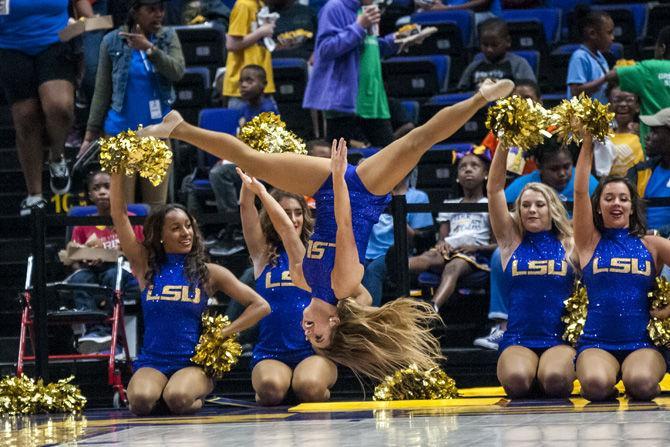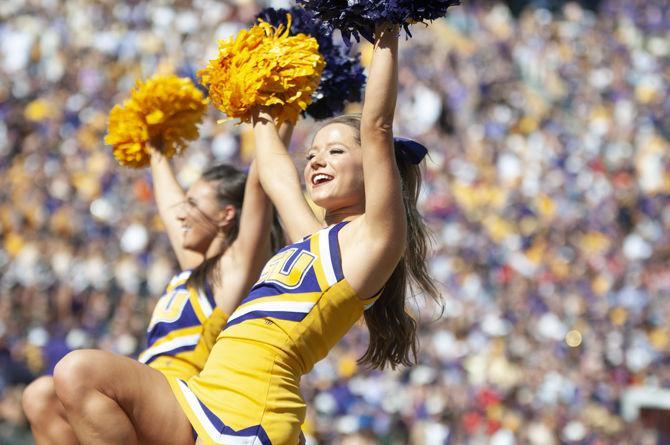The LSU Spirit Squad, composed of the cheerleaders, Tiger Girls and Team Mike, have an ambiguous athletic identity — what some call “halfletes.”
Technically, the University considers members of the Spirit Squad athletes, but does not consider the cheerleading and dance teams sports teams. This distinction is based on the number of times these teams compete each year, which is only once at Nationals, according to LSU Spirit Squad director Pauline Zernott.
“The thing that’s different is that we are not a sport because we don’t play games,” Zernott said.
Zernott said some members of the Spirit Squad are disappointed by the lack of competitions at the collegiate level because they grow up competing.
“When they get to college, it’s all about gameday spirit, so we’re no longer the focal point,” Zernott said.
As part of the athletic department, the Spirit Squad is required to follow NCAA guidelines, like maintaining grades, full-time student status and drug testing.
Even so, Spirit Squad members enjoy several of the perks of LSU student athletics with a few minor limitations. They have access to the training and workout facilities, athletic trainers and the Cox Communications Academic Center for Student-Athletes, Zernott said.
“We should know that just because they’re not deemed a sport, we are very much treated as athletes,” Zernott said. “Our athletic department hands-down is one of the most supportive in the SEC, if not the country.”
Spirit Squad members also get advanced course scheduling and have study halls like other athletic programs. Zernott can access team members’ attendance and grades if she feels a student may need additional academic assistance.
The University awards stipends to Spirit Squad members with at a 2.5 GPA based on their years involved with the teams, Zernott said. Second-year
members receive a $1,000 stipend, which increases by $500 each additional year.
The Spirit Squad also participates in promotional events throughout the year, which the University considers volunteer hours. The top 15 students with the most promotional event hours are awarded a volunteer stipend.
However, Spirit Squad members don’t have access to tutoring through the Cox Communications Academic Center for Student-Athletes, and instead must seek assistance from the Center for Academic Success, Zernott said.
Spirit Squad members also don’t have access to the meals in the training facilities, but they are allowed to take water bottles, Powerades and any of the dry snacks available, said Brendan Bice, one of three cheerleading captains.
The Spirit Squad is affiliated with the marketing department, unlike other athletic programs. Cheerleaders, Tiger Girls and Team Mike attend many promotional events and are sometimes required to arrive early to athletic events to pass out promotional items like towels and t-shirts.
Bice said he thinks the Spirit Squad isn’t prioritized financially because it doesn’t bring in as much money as other sports. He also said the Spirit Squad is “at the bottom of the totem pole” when it comes to scheduling practice and workout times.
The Spirit Squad and other athletic programs require similar time commitments. For example, cheerleaders spend about 20 hours or more per week in practice and mandatory workouts, Bice said. However, in addition to those 20 hours, Spirit Squad members also attend multiple athletic and promotional events and compete in Nationals once per year.
“I feel like we’re misrepresented sometimes,” Bice said. “A lot of people think we just do football and basketball games, but we compete nationally every year, which is a big deal.”
For Bice, a typical week consists of mandatory workouts and practice on Monday, Wednesday and Friday. As a member of the Nationals team, he also practices additional hours. Although Tuesdays and Thursdays are supposed to be their off-days, Bice said most team members still go to workouts.
Apart from football games, the Spirit Squad cheers and dances at volleyball, baseball, women’s and men’s basketball games and gymnastics meets. The cheerleading team also sends six couples to away games, Bice said.
“We don’t really have an off-season,” Bice said. “It’s cheer seven days a week.”
Despite the privileges awarded to the Spirit Squad as members of the athletic department, their adherence to NCAA guidelines puts them at somewhat of a disadvantage for Nationals, Zernott said. Each school in the SEC classifies its spirit squad differently. Some, like University of Kentucky, considers its spirit squad as student activities, and others, like Mississippi State University — until recently — considers its spirit squad as under the dean of students.
Since these universities don’t consider their spirit squads part of the athletic department, they don’t have to follow NCAA guidelines about drug testing, recruitment and transfer students.
“The competitive edge for us is lower because the other schools are not always policed the same way we’re policed under athletics,” Zernott said. “But, if you were to say how do we do, I would say we’re a top notch program because we abide by so many ethical ways of holding ourselves accountable.”
Even with their “halflete” status, Zernott said Spirit Squad members still value their experience at LSU.
“I don’t think any of them would trade the experience they get on a Saturday night in Tiger Stadium or a Tuesday evening in the PMAC for a basketball game or a Friday night at a gymnastics meet,” Zernott said. “The feeling they get to experience is like no other.”







